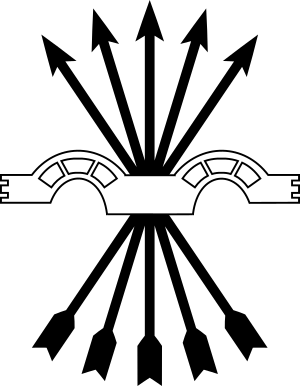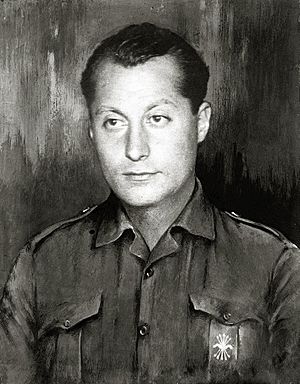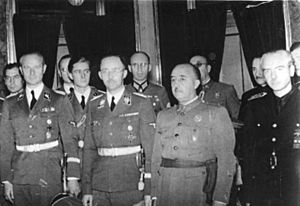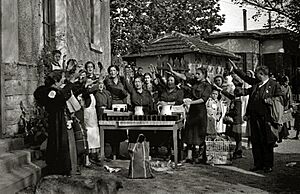Falangism facts for kids

Falangism (Spanish: Falangismo) was a political idea in Spain. It was followed by three main political parties known as the Falange. These parties were the Falange Española, the Falange Española de las Juntas de Ofensiva Nacional Sindicalista (FE de las JONS), and later the Falange Española Tradicionalista y de las Juntas de Ofensiva Nacional Sindicalista (FET y de las JONS).
Some historians think Falangism was a type of fascism, especially in its early years. Others believe it changed into a more authoritarian conservative movement during Francoist Spain.
In 1937, the first Falange party (FE de las JONS) joined with another group called the Carlists. This happened because of a rule made by Francisco Franco. The new group, FET y de las JONS, was meant to include all groups supporting Franco. It became the only political party allowed in Francoist Spain. Some original Falangists, like Manuel Hedilla, did not agree with this merger.
Falangism strongly believed in Spain's Roman Catholic faith. However, they also thought the state should have the most power, not the Catholic Church directly. They wanted total authority, clear social ranks, and strict order in society. Like fascism, Falangism was against communism, against democracy, and against liberal ideas.
The Falange's main ideas were written in a document called the "Twenty-Six Point Program of the Falange". This document said Falangism wanted Spain to be united. It also wanted to stop regions from breaking away. They aimed for a dictatorship led by the Falange. They believed in using strong methods to make Spain better. They also wanted to bring back and grow the Spanish Empire. These ideas were similar to fascism.
The document also called for a special economic system called national syndicalism. It supported changes to farming and growing industries. It respected private property. But it also wanted the state to control banks to prevent unfair lending.
The Spanish Falange and its related groups in Spanish-speaking countries promoted an idea called hispanidad. This idea wanted to unite Spanish-speaking societies around the world. This included their culture and economies.
Falangism said it was against both the political left and the right. It claimed to be a third way of thinking. However, many experts place Falangism on the far right of the political spectrum.
Contents
What Falangism Believed In
Nationalism and Views on Race
Falangism had strong ideas about Spain's identity.
During the Spanish Civil War, the Falange and the Carlists wanted Portugal to become part of Spain. The new Falange party continued to support this idea after they joined together in 1937. They also wanted Gibraltar to be part of Spain. Early Falange maps even showed Portugal as a province of Spain. After the civil war, some Falangists wanted to reunite with Portugal. They also wanted to take back former Spanish lands in the French Pyrenees. In 1942, Franco himself said Portugal should be part of Spain.
Some Falangists supported ideas about different races. They believed races were real and had different strengths and cultures. But unlike the Nazis, Falangism did not care about "racial purity." They did not say other races were worse. Instead, they believed every race had its own cultural importance. They thought that mixing the Spanish race with others created a "Hispanic supercaste." They saw this as a better, stronger group. They cared more about Spain's spiritual growth through Catholicism than about its biological race.
In Spanish Guinea, the Falange allowed local people called Emancipados to join. In 1938, there were Falangist groups for both native people and Europeans in Santa Isabel, Fernando Póo (now Malabo, Equatorial Guinea). By 1959, the Female Section of the Falange even taught Guinean women to prepare them for independence.
Franco admired Spain's Visigothic past. He said the Visigoths, a Germanic tribe, gave Spaniards their "national love for law and order." In the early years of Franco's rule, his government admired Nazi Germany. Spanish archaeologists even tried to show that Spaniards were part of the Aryan race. They focused on their Visigothic heritage to prove this.
The founder of the Falange Española, José Antonio Primo de Rivera, did not focus much on Jewish people. This was because there were very few Jewish people in Spain at that time. Primo de Rivera thought the "Jewish problem" could be solved if Jews converted to Catholicism. However, he did warn about Jewish-Marxist influences on workers. The Falangist newspaper Arriba claimed that a "Judeo-Masonic International" created both capitalism and Marxism. Primo de Rivera approved of attacks by Falangists on Jewish-owned stores in 1935.
The Spanish Falange and its related groups promoted the cultural, economic, and racial unity of Hispanic peoples. This idea was called "hispanidad". They wanted to create a group or federation of Spanish-speaking countries led by Spain.
Economic Ideas

Falangism supported a society where everyone worked together, not one divided by social classes. They were against class conflict. José Antonio Primo de Rivera said that the state was built on two ideas: serving the united nation and different social classes working together.
At first, Falangism in Spain, led by Primo de Rivera, wanted a "national syndicalist" economy. This system rejected both capitalism and communism. Primo de Rivera criticized capitalism for making workers like machines. He also criticized state socialist economies for making individuals slaves to the state.
The Falange's first main document, the "Twenty-Seven Points," called for a social revolution. It aimed to create a national syndicalist economy. This system would have national groups of both workers and employers. These groups would work together to control economic activity. The document also supported changes in farming and growing industries. It respected private property. But it wanted to control banks to stop unfair lending. It also said that strikes by workers and lockouts by employers were illegal. At the same time, it supported the state setting wages, similar to social democratic ideas.
After the Falange joined with the Carlists in 1937, the new Falange (FET y de las JONS) became the only political party in Francoist Spain. This new party was a mix of different groups. It said it supported an "economic middle way." This way was between liberal capitalism and Marxist ideas. They believed private businesses were the best way to produce things. But owners and managers had to work for the good of everyone. They also made it clear that the economy would still rely on private property. The state would only get involved in the economy if private businesses failed or if the nation needed it. In October 1937, the new Falange leader, Raimundo Fernández-Cuesta, said national syndicalism could work with capitalism. This pleased many non-Falangist right-wing groups.
The Falange during Franco's time supported the growth of cooperatives, like the Mondragon Corporation. This helped Franco's government claim that there were no social classes in Spain under his rule.
Falangism was strongly anti-communist. The Spanish Falange supported Spain joining World War II against the Soviet Union. This was because of their anti-communist beliefs. Spain joined the Anti-Comintern Pact and sent volunteers, called the Blue Division, to fight with Nazi Germany against the Soviet Union.
Gender Roles
The Spanish Falange had traditional ideas about women. They believed women's main jobs were to be loving mothers and obedient wives. This was different from the Second Spanish Republic, which had given women the right to vote. The Falange's Sección Femenina, 'Female Section' (Female Section) taught women how to be good wives and mothers. They also taught home economics. They promoted traditional Spanish folk dances through their Coros y Danzas, 'Choirs and Dances' (Choirs and Dances) groups. The Female Section allowed women like Pilar Primo de Rivera, José Antonio's sister, to have important public roles. Pilar never married, but she still promoted family life.
Important Falangist Thinkers
- José Antonio Primo de Rivera
- Nimio de Anquin
- Álvaro Cunqueiro
- Ernesto Giménez Caballero
- Carlos Ibarguren
- Pedro Laín Entralgo
- Ramiro Ledesma Ramos
- Leopoldo Lugones
- Eugenio d'Ors
- Leopoldo Panero
- José María Pemán
- Onésimo Redondo
- Dionisio Ridruejo
- Luis Rosales
- Pedro Sainz Rodríguez
- Rafael Sánchez Mazas
- Gonzalo Torrente Ballester
- Antonio Tovar
- Samy Gemayel
- Bachir Gemayel
- Pierre Gemayel
See Also
- List of Falangist movements
- Falange Auténtica
- Bolivian Socialist Falange
- Falange Española Independiente
- Falangism in Latin America
- Falangist Mountain Unity
- Kataeb Party
- National Falange
- National Radical Camp Falanga
- National syndicalism
- Philippine Falange
- National Radical Camp
Against Falangism
- Basque separatism
- Catalan independence movement
- Insubordinate movement in Spain
- Spanish republicanism



